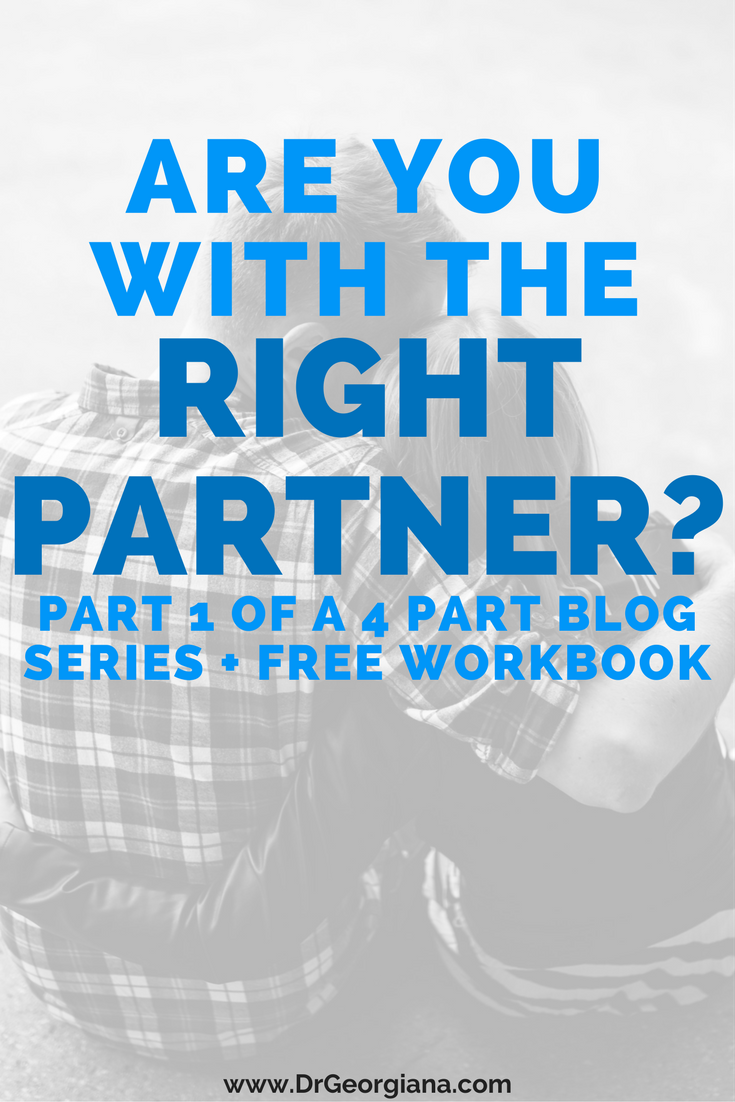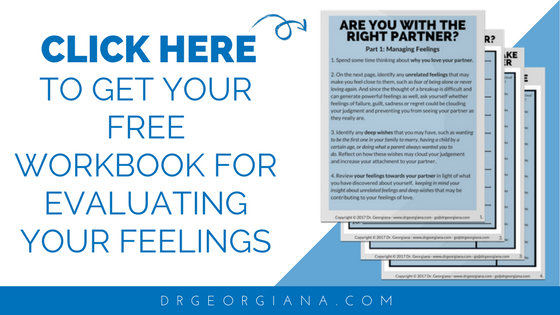If you’ve made it here, you are likely in a committed relationship and wondering if your partner is right for you. Maybe you have been thinking about leaving your partner for a long time and have never had the courage to break up. Maybe you have broken up and then gotten back together. Or maybe this is the first time that you are struggling with this idea and feel completely lost about what you want to do.
Whether you have struggled with the decision to stay or go for a few weeks, a few months, or a few years, it has been too long. It is time to clarify your thoughts and settle your mind.
Everyone knows that breaking up a committed relationship is a very difficult process. Leaving has huge implications emotionally, physically, spiritually, and financially but, it is just as true that not leaving the wrong partner can have even deeper and more negative implications in your life. And the longer you stay in a relationship that makes you unhappy, the deeper and more devastating the impact will likely be.
If you are dating someone that does not fit with you or has unhealthy or dangerous traits and behaviors, your happiness is at stake. You are probably blaming yourself for not taking action and every time you try to leave and come back, you probably feel weaker and more unsure of yourself.
I want you to know that you are not alone. There are thousands of people like you around the world who know they deserve to be happy but find themselves trapped in the wrong relationship.
I am here to offer a solution to your struggle…
I want to make the process of deciding whether to stay or go less painful by teaching you a system that will help you make the right decision for you.
By the end of this 4-part series, you will have more clarity about who your partner really is, a deeper understanding of what is working and what is not, a clear map to deal with your doubt and the tools necessary to follow through on whatever decision you make.
The first chapter of this series is about feelings and why they should not be the only factor in your decision-making process. Although this step is extremely difficult, it may also be the most important. Evaluating your partner outside of your feelings requires you to manage those feelings and be objective about who they really are.
I know how hard this can be as I have been in your shoes before. I too was in a relationship in which I struggled with the decision to leave my partner. They had a lot of the qualities I wanted in my life, and yet for almost one year I had this gnawing feeling that something was missing. I felt tremendously guilty because he loved me very much and I loved him. I kept asking myself why that was not enough for me.
My breakthrough came one day when I told him that I was going to help my family with a troubling issue. His response stopped me in my tracks. He said, “People have to help themselves. They can figure it out on their own.” It hit me hard. It was as though I was seeing him for the first time.
I couldn’t believe he would say something so callous and I began to comb my memory for other instances in which he may have shoved aside the needs of others or refused to help. I remembered an instance from a few months earlier when a friend called him to ask for advice and my partner told him: “Look, it’s a bad time right now, I’m in the middle of something. Can we talk another time?’’ The way he said those words, to a close friend, shocked me.
Because I did not live with him, I hadn’t followed his relationships. But something about the friend’s plea for help touched me. A few days later, I made a point to ask my partner if he had called his friend back. And he replied, “I will call him back sooner or later, but in the meantime, he can figure it out.”
My partner’s lack empathy should have been a clue but I was sidetracked by how well he treated me. He called me every day, brought me flowers, offered to pick me up at work and always remembered my schedule. I assumed that his attentiveness meant he thought of me and was a caring person. I allowed my positive feelings to overshadow the warning signs that deserved more of my attention.
Could feelings be so blind? It turns out they could.
At the next family dinner, I saw his sister alone in the kitchen. I approached her and asked how she got along with her brother. As it turned out, she too found him to be devoid of empathy. She never asked him for anything for fear he’d reject her or mock her. She also shared several examples where he showed zero empathy towards others. She said that I was the only person he made an effort for and that she hoped that it wouldn’t be short lived because he tended to do what it took to get what he wanted but always reverted back to his selfish ways.
I was shocked and confused. How could I fallen for someone that had no empathy? Was it because I wanted him to be the ‘love’ I had hoped for?
For months afterwards, I locked my radar on his level of empathy in different areas of his life, towards friends, colleagues, and neighbors. Disturbingly, I found that in most of his relationships, he showed a complete lack of empathy and kindness when people needed him.
For me, not having empathy for people in need is what I call a “non- negotiable,” something that I cannot live with, so I gathered the courage and left him. It was not easy, but I did it.
Managing Feelings
After I broke up with him, I asked myself why my feelings had deceived me. I felt love for this man, but what made me feel love for a person who did not show empathy towards others?
I had to think long and hard, but then it came to me. My father had often told me that women should marry and start a family at a young age. I was afraid to disappoint him as I was approaching 30 and wanted to believe I had found the man to have a family with. I wanted to be what my father wanted me to be.
Since then, my studies of Psychology and human behavior and over twenty years of coaching experience have convinced me that it is common to distort reality to make it fit with our deepest hopes and dreams. What we call love is at times a mixture of true appreciation for certain qualities the person has, chemistry, wishful thinking and other feelings that sometimes have nothing to do with the person at all. One of them is fear.
When I started to think about it, I realized there were other factors that had clouded my perception of my former partner. My father had often told me that women should marry and start a family at a young age. I was afraid to disappoint him as I was approaching 30 and wanted to believe I had found the man to have a family with. I wanted to be what my father wanted me to be.
For you, these fears could be different. For example, if you’re turning 40 soon and your deepest desire is to have a baby, the fear of being childless will seduce you into seeking love. This could lead you to focus on all of the things you like and make you feel good about the person that you are dating and tend to overlook or ignore the traits that do not feel so good. And this can go on for a long time, long enough to move in or have a baby with them.
Or maybe it’s not having a baby, but instead you’ve had a series of disappointing relationships in the past but you finally find someone who wants to commit. You commit to them, but over time you notice traits or behaviors that do not fit with you. The idea of going back into the dating world scares you so you hang on to your feelings for the person and make these feelings much bigger than they actually are. In this case, your love for your partner could be a mixture of true appreciation for who they are and your fear of not being able to find anyone else who loves you.
This is not your fault. Feelings are tricky. From my experience with coaching, even in extreme situations people will overlook reality in the name of love and it clouds their ability to reason.
To some people, the thought of keeping an objective, outside look on your feelings may seem counter-intuitive and hard to do. Of course it’s not healthy to overlook and ignore your feelings, as they are wonderful tools that if recognized, understood and used correctly can help you make the right decision in relationships. But I am suggesting you do 4 things:
- Spend some time thinking about why you love your partner.
- Identify any unrelated feelings that may make you feel close to them, such as fear of being alone or never loving again. And since the thought of a breakup is difficult and can generate powerful feelings as well, ask yourself whether feelings of failure, guilt, sadness or regret are clouding your judgment and preventing you from seeing your partner as they really are.
- Identify any “deep wishes” you may have, such as being the first one in your family to marry, having a child by a certain age, or doing what a parent always wanted you to do. Reflect on how these wishes may increase your attachment to your partner.
- Review your feelings towards your partner in light of what you have discovered about yourself, keeping in mind your insight about unrelated feelings and deep wishes that may be contributing to your feelings of love.
I’ve setup a simple workbook for you to list these thoughts and feelings. You can download it by clicking the button below.
After you have taken these 4 steps, you may feel unsettled or fearful. You may wonder if you will ever meet another person who will have some of the qualities that your partner has and who will love you.
I promise that if you are unhappy, there are people out there better suited for you. And as long as you sit in a relationship with the wrong person, these other people will keep walking by you. Even though you may be afraid of the future, be strong and continue to manage your feelings.
My goal in this series is to ease your pain and make it easier for you to make the right decision, whatever it will be.
Over the next few weeks, I’ll be sharing important things to consider when making your decision about your partner. As I release them, I’ll link them here for easy access:
Part 2: Focusing On the Negatives
Part 4: Evaluating Unhealthy Traits And Behaviors
Before then, make sure that you to complete the exercises in the workbook so that you are ready to look at your partner objectively. It can be tempting to ignore these feelings but trust yourself, don’t stop evaluating, and don’t sell yourself short.

